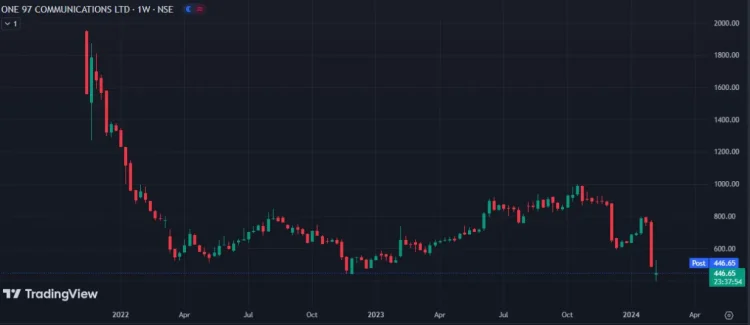I see that you are interested in Paytm share price, a leading fintech company in India. According to the latest finance results, Paytm share price crash and has dropped by nearly 10% today, reaching a new low of 380 INR per share. This is a sharp decline from its IPO price of 2,150 INR per share in November 2023.
Paytm stock price is cracking and hitting lower circuits daily. I am worried that it may become a penny stock in 2024 itself.
The reason for this plunge is the regulatory action taken by the Reserve Bank of India (RBI) against Paytm for violating the norms of its Payments Bank license. The RBI has frozen Paytm’s UPI transactions and asked it to comply with the rules by February 29, 2024, or face further penalties
Paytm’s founder and CEO, Vijay Shekhar Sharma, has met with the RBI officials and the Finance Minister, Nirmala Sitharaman, to discuss the issue and seek an extension of the deadline. He has also assured the investors and customers that Paytm will overcome the challenges and continue to operate as usual.
However, some analysts and experts have expressed doubts about Paytm’s ability to resolve the regulatory crisis and maintain its market share and profitability. They have also warned that the stock may see more volatility and downside in the coming days and weeks.
Read also:
Hidden Dangers of These 3 Multibagger Penny Stocks. BIG NO
Paytm Share Price Crash
The trajectory of PAYTM, once a towering figure in the Indian fintech realm, now seems poised to lead it into penny stock territory. Amidst regulatory hurdles, shifting market dynamics, and intensified competition, the company’s stock has seen a steady decline, inching closer to the penny threshold.
Read also:
Multibagger Stock Suzlon Can Make Your 1 Lakh into 21 Lakhs

Once adorned with lofty valuations and investor enthusiasm, PAYTM’s descent reflects the harsh realities of the ever-evolving financial landscape. Regulatory challenges, coupled with changing consumer behaviors and fierce competition, have eroded investor confidence, resulting in a significant depreciation of the stock’s value.
Despite its current struggles, PAYTM remains a symbol of resilience and adaptability. With a renewed focus on innovation, strategic partnerships, and diversification, the company seeks to reverse its fortunes and regain investor trust. However, the road ahead is fraught with uncertainty, and the journey to recovery may be long and arduous.
For investors eyeing PAYTM’s descent into penny stock territory, the allure of potential gains at rock-bottom prices may be enticing. Yet, it’s essential to tread cautiously, as investing in penny stocks carries inherent risks, including volatility and liquidity concerns.
As PAYTM navigates the turbulent waters of the market, its fate hangs in the balance. Whether it can overcome its current challenges and emerge stronger remains to be seen. In the world of stocks, where fortunes can change in an instant, only time will tell if PAYTM can defy the odds and stage a comeback from its looming status as a penny stock.
Paytm RBI Issue: Action Against Paytm Under Section 35A of the Banking Regulation Act, 1949
In a recent announcement, the Reserve Bank of India (RBI) disclosed that the crackdown on Paytm Payments Bank stemmed from its persistent failure to adhere to regulatory norms. RBI Deputy Governor Swaminathan J emphasized ongoing monitoring of Paytm Payments Bank, pledging further action as deemed necessary.
In a Press Release dated March 11, 2022, the Reserve Bank of India (RBI), exercising its authority under section 35A of the Banking Regulation Act, 1949, instructed Paytm Payments Bank Ltd (PPBL) to cease onboarding new customers immediately.
Following a Comprehensive System Audit report and subsequent compliance validation report by external auditors, persistent non-compliance and significant supervisory concerns were identified in the bank.
Consequently, the RBI, utilizing its powers under section 35A of the Banking Regulation Act, 1949, and other relevant provisions, issued the following directives to Paytm Payment Bank:
Paytm Ban in India
1. Allowing no further deposits, credit transactions, or top-ups in customer accounts, prepaid instruments, wallets, FASTags, NCMC cards, etc., beyond February 29, 2024, except for any interest, cashback, or refunds credited at any time.
2. Permitting customers to withdraw or utilize balances from their accounts, including savings bank accounts, current accounts, prepaid instruments, FASTags, National Common Mobility Cards, etc., without any restrictions, up to their available balance.
3. Prohibiting the provision of any banking services, apart from those mentioned in (ii) above, such as fund transfers (including AEPS, IMPS, etc.), BBPOU, and UPI facility after February 29, 2024.
4. Terminating the Nodal Accounts of One97 Communications Ltd and Paytm Payments Services Ltd. promptly, but no later than February 29, 2024.
5. Ensuring settlement of all pipeline transactions and nodal accounts (pertaining to transactions initiated on or before February 29, 2024) by March 15, 2024, with no further transactions permitted thereafter.
RBI Governor Shaktikanta Das underscored the severity of the violation, stating that the stringent measures were implemented with systemic stability and customer protection in mind.
“All actions of RBI are in the best interest of systemic stability, protection of customers’ interest,” Mr. Das emphasized. He further elaborated that when constructive engagement fails, imposing business restrictions becomes necessary.
While detailed specifics of the case remain undisclosed, Governor Das assured the public of forthcoming clarifications through a FAQ release. The RBI’s directive last week, mandating Paytm Payments Bank to cease accepting new deposits, arose from supervisory concerns and non-compliance with regulations.
One of the primary concerns driving the RBI’s action was the creation of numerous accounts on Paytm Payments Bank lacking proper identification. These accounts, lacking adequate Know-Your-Customer (KYC) verification, conducted transactions worth substantial sums, raising apprehensions of potential money laundering.
Moreover, instances of over 1,000 users linking the same Permanent Account Number (PAN) to their accounts further exacerbated regulatory concerns. The compliance records provided by the bank were deemed inaccurate during verification processes conducted by both the RBI and auditors.
So, due to the Paytm ban in India, Paytm share price crash and it is not yet over.
Therefore, it is hard to predict whether Paytm will become a penny stock or not, as it depends on many factors, such as the outcome of the negotiations with the RBI, the customer and investor sentiment, the competitive landscape, and the overall market conditions.
Macquarie Slashes Target: Paytm’s Uphill Battle
1. Macquarie’s Target Slashed
Macquarie, a global broking firm, has dramatically cut its 12-month price target on One97 Communications Ltd., the parent company of Paytm.
This decision comes amid heightened regulatory scrutiny. The target reduction reflects concerns about the company’s performance.
2. Paytm Faces Customer Exodus Risk
India’s fintech giant, Paytm, is potentially fighting for survival after the central bank ordered a halt to much of its business activities.
The Reserve Bank of India (RBI) has been closely monitoring Paytm, and persistent non-compliance has been cited as one of the issues with the company. Despite efforts to focus on compliance, the situation remains challenging
3. Market Rout and Downgrade
Paytm’s banking unit has faced challenges, leading to a significant decline in its share price. Global broking firm Macquarie downgraded Paytm from a neutral call to underperform, and as a result Paytm share price crash. The downgrade highlights the company’s struggles.
4. Compliance Efforts
Paytm has made compliance a priority, implementing internal changes to adhere to regulatory rules and restrictions. However, some industry insiders believe these efforts may have come too late. The RBI’s recent action against Paytm’s Payments Bank underscores the importance of timely compliance⁴.
In summary, Paytm is navigating a challenging landscape, with regulatory scrutiny and market pressures impacting its operations. The company’s ability to address compliance issues and regain investor confidence will be crucial in the coming days.
A penny stock is generally defined as a stock that trades below 1 USD or 85 INR per share, but there is no official or legal definition of the term.
If you are interested in investing in Paytm or any other stock, I would advise you to do your own research, consult a financial advisor, and be aware of the risks involved. Investing in the stock market can be rewarding, but also risky and unpredictable.
I hope this information was helpful to you. If you have any other questions or topics you want to chat about, please let me know. I’m always happy to talk with you.
Read more on Penny Stocks:
Penny Stocks For Dummies: Step by Step Ultimate Guide
Which Penny Stocks Will Boom In 2024? Expose the Covert Gem
Unveiling The Hidden Gems: Best Penny Stocks Under Rs 1 [2024]

